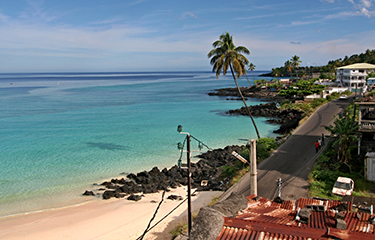Comoros was one of three African countries picked to benefit from the ongoing first phase of the South West Indian Ocean Fisheries Governance and Shared Growth (SWIOFish 1) program, but the country is still grappling with serious economic and social constraints that will require drastic governance reforms if the project is to achieve its objectives by 2021.
Comoros, also known as the Comoro Islands, is an archipelago of volcanic islands off the south-east coast of Africa. It was picked, along with Tanzania and Mozambique, for the "South West Indian Ocean Fisheries Governance and Shared Growth Project,” an initiatived led by the World Bank that aims to create a sustainable seafood industry through improved management of the fisheries sector.
Optimism surrounding the project stems from the achievements of a previous World Bank-supported undertaking – a project called "Co-Managing of Coastal Resources for Sustainable Livelihoods (CoReCSUD)" – that addressed challenges hampering the performance of the country’s fisheries sector. The success of that project revived the Comoros' government’s desire to revamp its marine and inland commercial fishing operations.
The SWIOfish1 project is to be implemented over a six-year period, and targets the reduction of fish stock degradation, increasing the contribution of fisheries to respective national economies, and enhancing value-addition to marine and inland catches.
But Comoros faces huge obstacles to achieving its aim with SWIOFish, such as acute energy shortages, inadequate and in some cases obsolete fishing equipment, very limited financial backing from the national budget, and a lack of coordination of the country’s fishing industry. All of this is in spite of various state agencies engaged in fisheries management, monitoring and safety at sea, and research and training.
Comoros’ state electricity companies are operating at near-bankruptcy, and are unable to sustain a regular supply of power critical for the growth and expansion of cold-storage activities that currently have an installed capacity of 30.6 MW – although only 14.5 MW is available according to the African Development Bank.
In addition, the World Bank has identified dilapidated landing sites, a lack of commitment from government agencies, and haphazard allocation of national resources as major hindrances to the success of initiatives to grow the island nation's fisheries sector, which currently contributes 24 percent to the nation's agricultural GDP and 7.5 percent to the national economy overall.
“Specialized services remain limited for shipbuilding and ship repair, and for small-scale fishing equipment bunkering,” the bank said in its report.
Comoros' ambitions for its fisheries – which are largely artisanal – include the entrenchment of the co-management concept that entails involving fishing communities in decision-making on the management of their fisheries so as to minimize overfishing and boost the economic benefits of the fishing industry to those communities.
The government’s strategy in ensuring Comoros fishers reap economic benefits includes investing in value addition, which includes modern infrastructure to support artisanal fisheries. That infrastructure includes new landing sites, cold storage, and ice machines, all which require a reliable supply of electricity.
Comoros, which has an exclusive economic zone of about 160,000 square kilometers, is located in a tuna-rich area at the mouth of the Mozambique Channel. The country produces an estimated 16,000 tons of fish annually, of the country’s existing potential of 33,000 tons per year, according to the World Bank.
“State support to the sector remains limited despite the existence of various sector institutions for management, monitoring and safety at sea, sanitary control, research and training,” the bank’s report said.
The government has also recently had another major setback when the European Union listed Comoros as one of the countries that have either failed or are abetting illegal, unreported, and unregulated fishing, leading to the termination of an earlier trade agreement for the island nation’s tuna and tuna-like species.
The E.U. reaffirmed in early 2019 a decision taken the previous year by the European Commission to denounce its partnership agreement with Comoros after the country was identified “as a non-cooperating third country in fighting IUU fishing.”
Before the denunciation of the agreement, Comoros was earning USD 1.3 million (EUR 1.17 million) every year from foreign vessels that paid to access the country's fishing grounds. This was 0.7 percent of the country’s total national revenues by 2017. At least 50 percent of these earnings were proceeds from the agreement with the E.U., which is now obsolete.
Nevertheless, some success has been reported with the World Bank’s CoReCSUD project, which involved training fishing communities on sustainable fishing and the development and integration of fisheries co-management plans by various fishing villages – meant to address overfishing. The plans include bans on the use of gillnets, bed nets, dynamite fishing, and the use of fish poison.
The project, which also received USD 2.73 million (EUR 2.45 million) from the International Development Association and the Japanese Social Development Fund, enabled Comoros to develop a few storage facilities for the safe keeping of fishing equipment, and the construction of a fish-drying facility to ensure prolonged seafood shelf-life.
Photo courtesy of Rostasedlacek/Shutterstock







